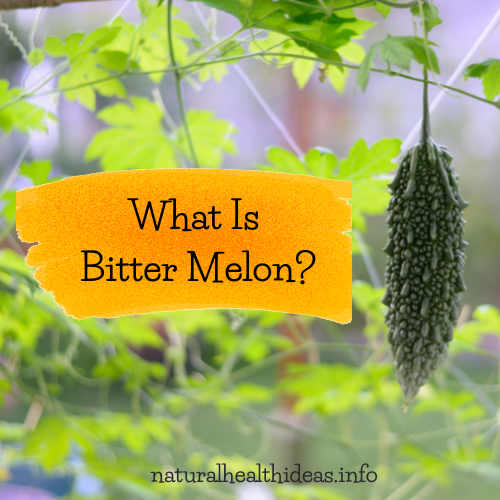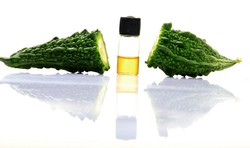 What Is Bitter Melon |
Bitter Melon - A Natural Diabetes Cure
Bitter melon looks like the cucumber’s uglier cousin. It’s bumpy and reminiscent of a gourd. The plant has a long history of being used as both a food and a medicine. In holistic health circles, it’s famous for its ability to lower blood sugar levels.
Before the development of insulin, various cultures treated diabetes with a host of traditional plant remedies. Nowadays, bitter melon juice is being touted as a cure for Type 2 (adult onset) diabetes. Since the prevalence of diabetes is reaching a critical point, it’s worth taking a closer look at the benefits of bitter melon.
9 Health Benefits and Side Effects of Bitter Gourd
Health Benefits Bitter Melon - Management of Diabetes
Every part of bitter melon—but most notably the fruit—contains chemical compounds similar to insulin. This is the hormone that allows blood sugar to pass from the bloodstream into the cells. Diabetics do not make enough insulin, or the cells become resistant to its effect.
Several studies on people and animals have found that the insulin-like compounds in bitter melon reduce blood sugar and help treat diabetes; however, critics say the proof is not sufficient. This is because only double-blind placebo-controlled studies are accepted as evidence. As yet no large study of this type has been done on bitter melon.
Don’t count on seeing such a study any time soon. There’s no monetary incentive to do it for a plant that’s easy to grow and can’t be patented.
There is plenty of proof based on observation. Herbalists and naturopathic doctors often recommend it to their diabetic patients. The primary problem with bitter melon is that it works too well. If you’re already taking medication, let your doctor know you want to use bitter melon so your medications can be adjusted. Adding it to your regimen could cause diabetes complications—hypoglycemia.
Bitter Melon Supplements
Buy Bitter Melon
You can buy bitter melon health food stores or Asian markets when it’s in season. Bitter melon tea is made by boiling the fruit, or you can squeeze the fruit for bitter melon juice. If you prefer, just buy the supplement in pill form.
Bitter melon has been eaten by hundreds of generations of people so we know it is safe to eat, but Westerners may take a while to get used to its bitter taste. If you decide to eat the fruit, a small unripe melon divided 3 ways eaten over the course of the day is sufficient.
One of the traditional uses is for abortion so pregnant women should stay away. Safety standards haven’t been determined for children.
Bitter melon has also been used to stimulate menstruation, increase fertility, stimulate milk supply in nursing mothers, and as an aphrodisiac. There is still much research to do on this plant, so do use common sense.
More articles in the 'bitter" series
You might also like
Yunnan Baiyao - Herb To Stop BleedingIf you're dealing with any health problem where bleeding is a issue, Yunnan B...
What Are Bitters?Herbal bitters have a long history as a digestive aid -- perfect for holiday ...












 Do Aromatherapy Candles Actually Work?on 01/18/2023
Do Aromatherapy Candles Actually Work?on 01/18/2023
 Why Eat Fermented Foods?on 10/23/2022
Why Eat Fermented Foods?on 10/23/2022
 Milk Bath Secretson 10/05/2022
Milk Bath Secretson 10/05/2022
 Detox Bath Recipeon 10/01/2022
Detox Bath Recipeon 10/01/2022



Do you know someone who could benefit from bitter melon?
@DerdriuMarriner The asafoetida is for flavoring--an onion/garlic substitute for those watching acid indigestion. Bitter melon is the active ingredient. If not available locally, then online. You can always season to taste.
It's convenient that some ingredients in the recipe can be found in grocery stores.
But is it mandatory to the efficacy of the treatment, or just preferable, to get bitter melon, mustard, red chili powder, salt and turmeric as well as asafoetida at special stores? And would it be best to let the specialist there know why the ingredients are being collected?
I had pre diabetes and used this to keep from developing it full blown. It does work.
Good warning about combining this with medication you may already be taking. You definitely need to be careful about the 2 working together and dropping your levels too low.
Unfortunately true. Thanks for commenting!
Interesting! And you're right when you say, "Don’t count on seeing such a study any time soon. There’s no monetary incentive to do it for a plant that’s easy to grow and can’t be patented".
@Digby_Adams It's a curious little thing. Thanks for stopping by!
Well you've got me curious about this one. I think that I'll take a look around for it. Thank you for a very interesting article.